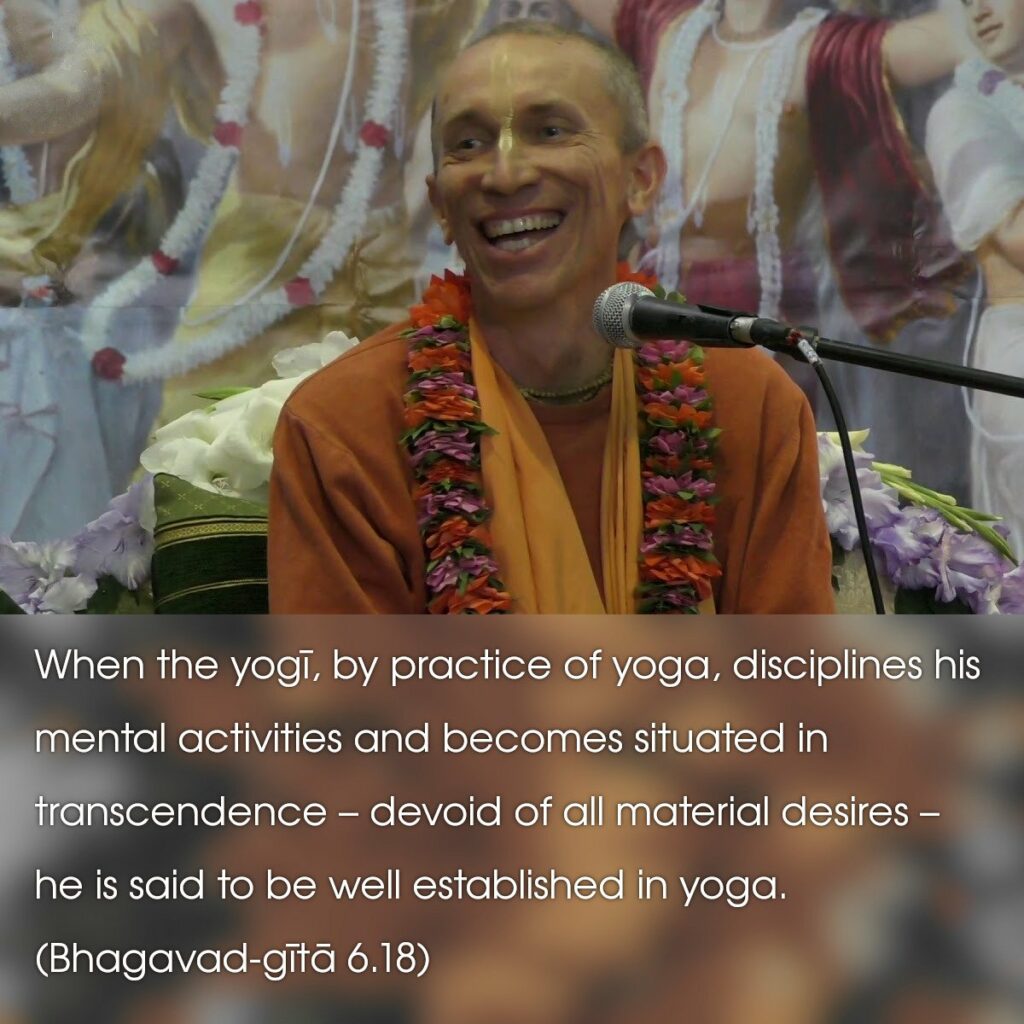यदा विनियतं चित्तमात्मन्येवावतिष्ठते |
नि:स्पृह: सर्वकामेभ्यो युक्त इत्युच्यते तदा || 18||
yadā viniyataṁ chittam ātmanyevāvatiṣhṭhate
niḥspṛihaḥ sarva-kāmebhyo yukta ityuchyate tadā
yadā—when; viniyatam—fully controlled; chittam—the mind; ātmani—of the self; eva—certainly; avatiṣhṭhate—stays; nispṛihaḥ—free from cravings; sarva—all; kāmebhyaḥ—for yearning of the senses; yuktaḥ—situated in perfect Yog; iti—thus; uchyate—is said; tadā—then
Translation:
When the perfectly controlled mind rests in the Self free from longing for all enjoyments, then one is said to have attained yoga.
Commentary:
When the mind is merged in Atma, that very moment man attains Moksha, liberation from all the ills and evils of human existence. Three aspects of Yogasiddhi are mentioned here – (1) Desirelessness, (2) Control of mind, and (3) Union with Atma. The same process is stated in Vedanta in different terminology (1) Vasanakshaya, (2) Manonasa, and (3) Tattvajnana. One is actioned by the others (i.e.) by the elimination of all desires mind ceases to exist, and the Atmajnana is realised. When Atmajnana dawns the mind with all its propensity for material enjoyment is destroyed.
Desires are the shackles that bind man to samsara. When these desires disturb the mind, Dhyana is not possible. When by discrimination and dispassion, desires are rooted out, the pure mind automatically merges in Atma which is the source from which it has risen. All the desires without any reservation should be given up.
The mind should be brought to one focal point and remain steady at that point, namely the Self. The least distraction draws it away from the object of meditation.
The mind should rest in Atma alone, to the complete exclusion of everything else. When there are no desires and distractions, the mind by itself comes to rest in its own source-Atma.
Such a yogi who rests steadfastly in Atma is Yogarudha. He is united with the supreme Self.
Sri Ramakrishna Says —
Sri Ramakrishna: “Some are born with the characteristics of the yogi; but they too should be careful. It is ‘woman and gold’ alone that is the obstacle; it makes them deviate from the path of yoga and drags them into worldliness. Perhaps they have some desire for enjoyment. After fulfilling their desire, they again direct their minds to God and thus recover their former state of mind, fit for the practise of yoga.
….. “Unless the mind becomes steady there cannot be yoga. It is the wind of worldliness that always disturbs the mind, which may be likened to a candle-flame. If that flame doesn’t move at all, then one is said to have attained yoga.
‘Woman and gold’ alone is the obstacle to ‘yoga. Always analyse what you see. What is there in the body of a woman? Only such things as blood, flesh, fat, entrails, and the like. Why should one love such a body? ….
“The mind of the yogi is always fixed on God, always absorbed in the Self. You can recognize such a man by merely looking at him. His eyes are wide open, with an aimless look, like. the eyes of the mother bird hatching her eggs. Her entire mind is fixed on the eggs, and there is a vacant look in her eyes. Can you show me such a picture?”
M: “I shall try to get one.” (Source: Gospel of Sri Ramakrishna)
Related Articles:
- The harmonised yogi who knows the essence of things, thinks “I do nothing”, seeing, hearing, touching, smelling, eating, moving, sleeping, breathing, speaking, giving, grasping, opening, and closing the eyelids even. He is convinced that the senses move among the objects of the senses. (BG 5.8 & 5.9)
- He who acts placing all actions in the eternal Brahman, giving up attachment, is unaffected by sin like the lotus by water. (BG 5.10)
- Whenever and wherever the restless and unsteady mind wanders, one should bring it back and continually focus it on God. (BG 6.26)
Question: When is it said that man has attained unity with Atma?
Answer: When there are no desires, when the mind is controlled and rests in the Self, then it is said that Yogasiddhi is achieved. When these conditions are fulfilled, man attains liberation, (Moksha) freedom from everything that binds man to earthily life.
Bhagavad Gita: Chapter 6 🔻 (47 Verses)
